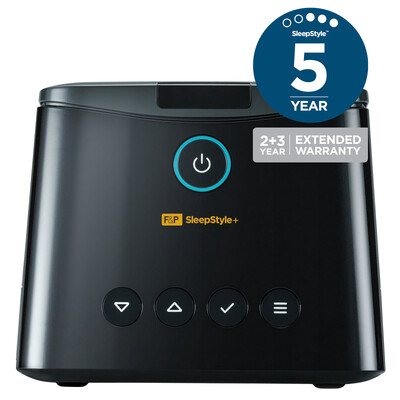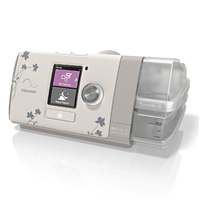Auto Pressure CPAP Machines
Auto pressure CPAP machines automatically adjust your CPAP pressure on a breath by breath basis. This provides you with the ideal pressure and comfort throughout the entire night. These machines have 4G wireless connectivity, integrated humidification and heated tubing. There is even an AutoSet For Her version and an AirMini Travel device now available.
CPAP Club have a range of premium automatic CPAP machines at discounted prices from leading brands such as ResMed, Fisher & Paykel and Lowenstein.
Looking to save by bundling? Click here to view our CPAP Packages and Bedside Starter Kits with everything you need to get started.

Lowenstein Prisma 20A Auto CPAP Machine with Heated Tube, AQUA Humidifier & 4G Modem
SKU: LOW296001111
Now $2,199.00

Philips Respironics DreamStation Auto CPAP Machine with Humidifier
SKU: PHIAUX500T15
Now $990.00

Fisher & Paykel SleepStyle+ Auto CPAP Machine with 5yr Warranty
SKU: FPSSPAAA
Now $1,339.00

Lowenstein Prisma SMART Max Auto CPAP Machine with PrismaAQUA Humidifier & Heated Tube
SKU: LOW319601210
Now $1,690.00

Philips DreamStation Auto CPAP Auto + Humidifier & 4G Modem
SKU: PHIAUX500T15C
$1,359.00
At CPAP Club, we offer a wide range of Auto Pressure CPAP machines designed to make your treatment as effective and comfortable as possible. Whether you’re new to CPAP therapy or looking to upgrade to a more advanced machine, we have options to suit every need. Explore our selection today and experience the difference that an Auto Pressure CPAP machine can make in your sleep, health, and daily life.
APAP Machines Explained
Understanding APAP Technology
Commonly still referred to as a CPAP Macine, an Automatic Positive Airway Pressure (APAP) machines deliver variable air pressure throughout the night to keep the airway open and prevent sleep apnea events. Unlike standard CPAP units that maintain a single fixed pressure, APAP devices automatically sense changes in breathing patterns and adjust pressure levels in real time for optimal comfort and therapeutic effectiveness.
What APAP Stands For
APAP stands for Automatic Positive Airway Pressure. This name reflects the machine’s ability to monitor breathing and automatically provide the precise pressure required at any moment.
How an APAP Machine Works
APAP machines are equipped with sensitive sensors and algorithms that detect subtle fluctuations in airflow. When the airway begins to collapse or resistance increases, the device raises the pressure to maintain airway patency. If breathing stabilises, it reduces pressure to the lowest effective level, enhancing comfort and reducing noise.
Ideal Candidates for APAP Therapy
1. Allergy or Nasal Congestion Sufferers
Nightly variations in nasal airflow from allergies, sinus issues, or colds make fixed-pressure therapy challenging. APAP machines seamlessly compensate for these changes, ensuring uninterrupted treatment even when congestion fluctuates.
2. Patients with COPD or Respiratory Conditions
During REM sleep, throat muscles relax further, often worsening obstructive events. For individuals with chronic obstructive pulmonary disease (COPD) or similar respiratory disorders, APAP devices dynamically adjust pressure to counteract these intensified breathing restrictions.
3. Back Sleepers
Sleeping on your back naturally encourages the tongue and soft tissues to fall backward, narrowing the airway. APAP technology recognises this positional change and automatically increases pressure to maintain airflow.
4. Weight Fluctuations
Gaining or losing weight alters airway anatomy and the pressure needed for effective therapy. APAP machines adapt instantly without requiring a new sleep study or manual pressure adjustment.
5. Alcohol Consumption Before Bed
Alcohol relaxes throat muscles, increasing the risk of apneas. APAP devices raise pressure when necessary, counteracting these effects for more consistent therapy.
APAP vs. CPAP Machines
Automatic Positive Airway Pressure (APAP)
-
Adaptive Pressure: Continuously adjusts to your needs throughout the night.
-
Pros:
-
Eliminates the need for repeat sleep studies after lifestyle or weight changes.
-
Adapts to shifting sleep positions and varying congestion levels.
-
Uses only the pressure required, improving comfort and conserving energy.
-
Most APAP machines can function as a fixed pressure CPAP machine if required.
-
-
Cons:
-
Not ideal for patients with certain conditions such as congestive heart failure or low blood pressure.
-
Rapid pressure shifts may cause brief awakenings.
-
Requires a well-fitted mask to prevent air leaks during pressure changes.
-
Continuous Positive Airway Pressure (CPAP)
-
Fixed Pressure: Delivers a single, prescribed pressure determined by a sleep study.
-
Pros:
-
Simple, consistent therapy with no pressure fluctuations.
-
Stable airflow avoids sudden changes that may disturb sleep.
-
-
Cons:
-
Cannot automatically adjust for weight loss, allergies, or positional changes.
-
Requires a repeat sleep assessment to monitor and change the pressure setting if required.
-
Getting Started with Your APAP Machine
-
Assemble Components: Connect the humidifier chamber to the main unit (if applicable), attach the hose, and secure the mask.
-
Check Mask Fit: Ensure a snug, comfortable seal to prevent air leaks during pressure changes.
-
Power On and Adjust Settings: Follow your clinician’s prescribed range or use auto mode if recommended.
-
Begin Therapy: Lie back, relax, and allow the machine to monitor and adapt to your breathing.
Key Advantages of Choosing APAP
-
Personalised Therapy: Adjusts second-by-second to your unique breathing patterns.
-
Greater Comfort: Delivers only the necessary pressure, reducing discomfort.
-
Convenience: Ideal for people with varying health conditions, weight changes, or shifting sleep habits.
Final Thoughts
APAP machines offer a highly responsive and comfortable alternative to fixed-pressure CPAP therapy. By continuously adapting to your breathing needs—whether you’re congested, sleeping on your back, or experiencing lifestyle changes—APAP ensures optimal airway support and a restful night’s sleep with minimal intervention.











